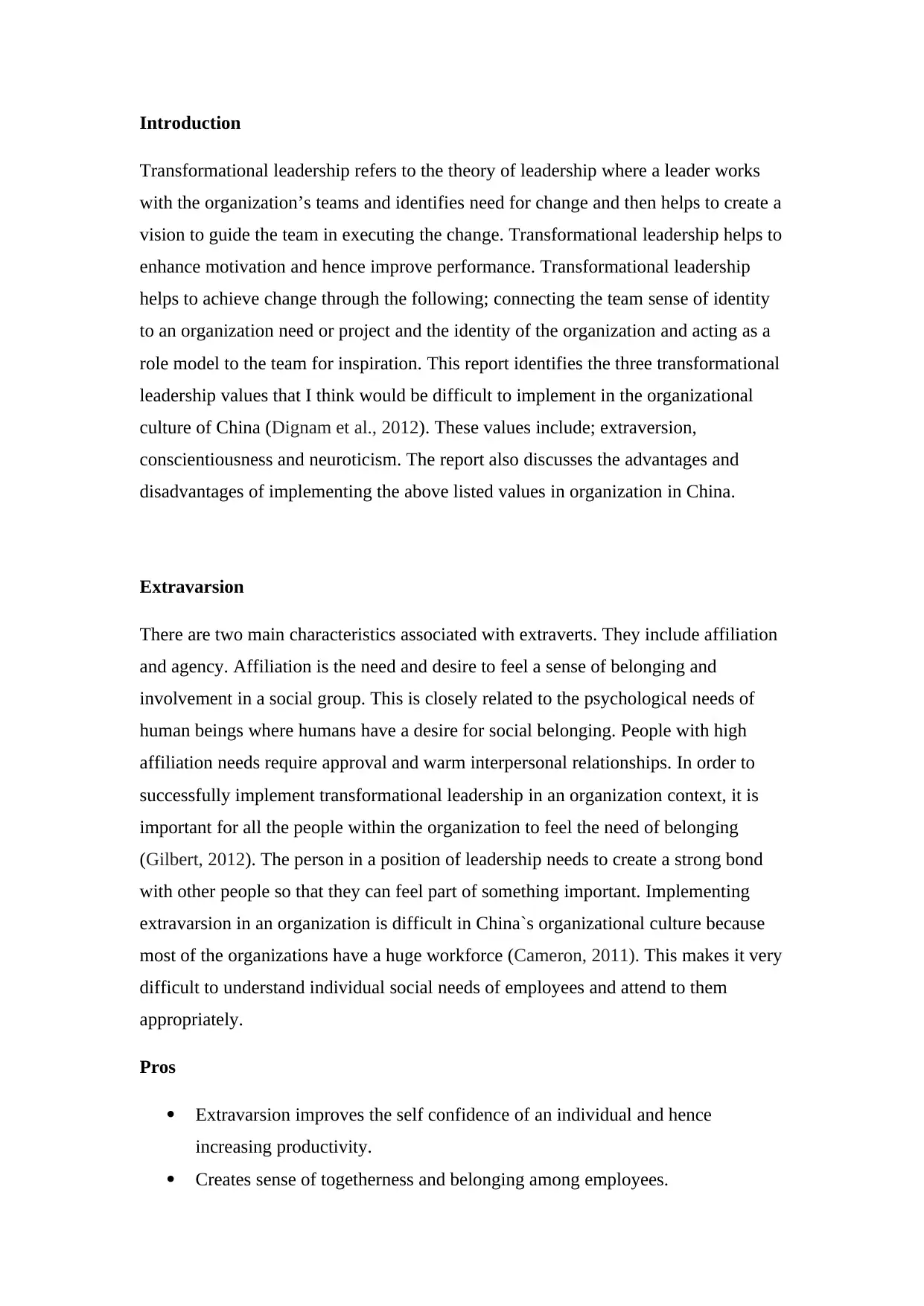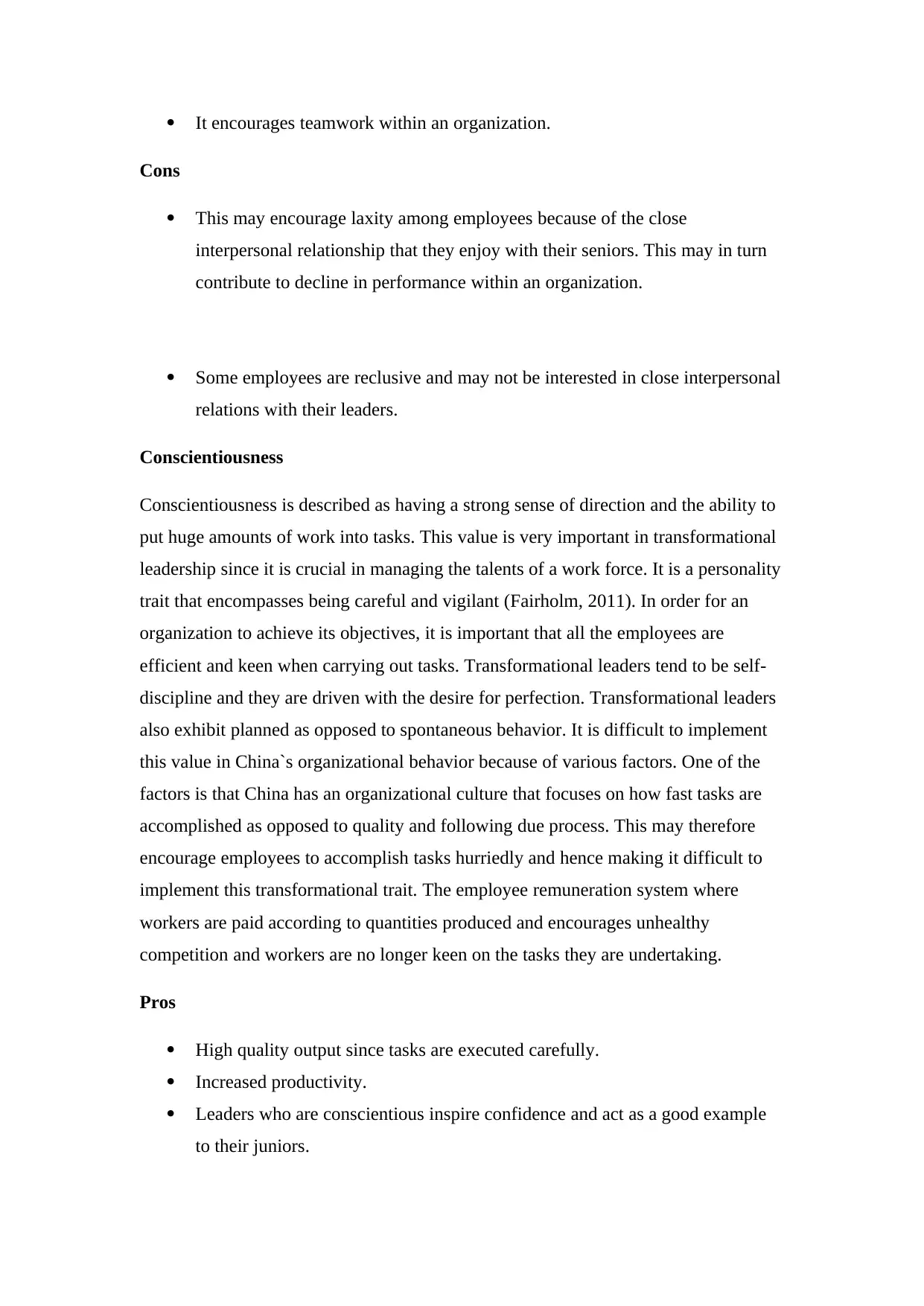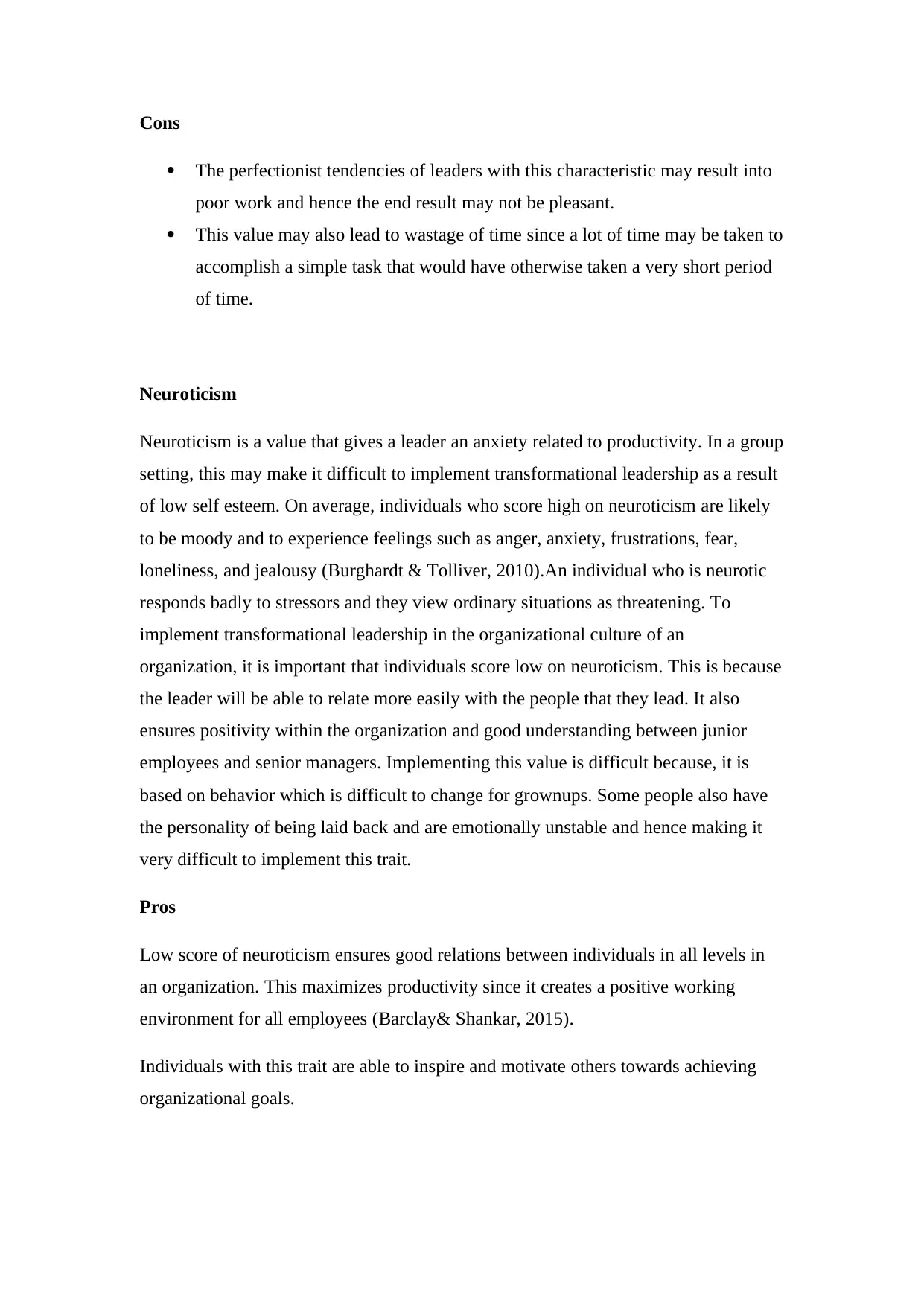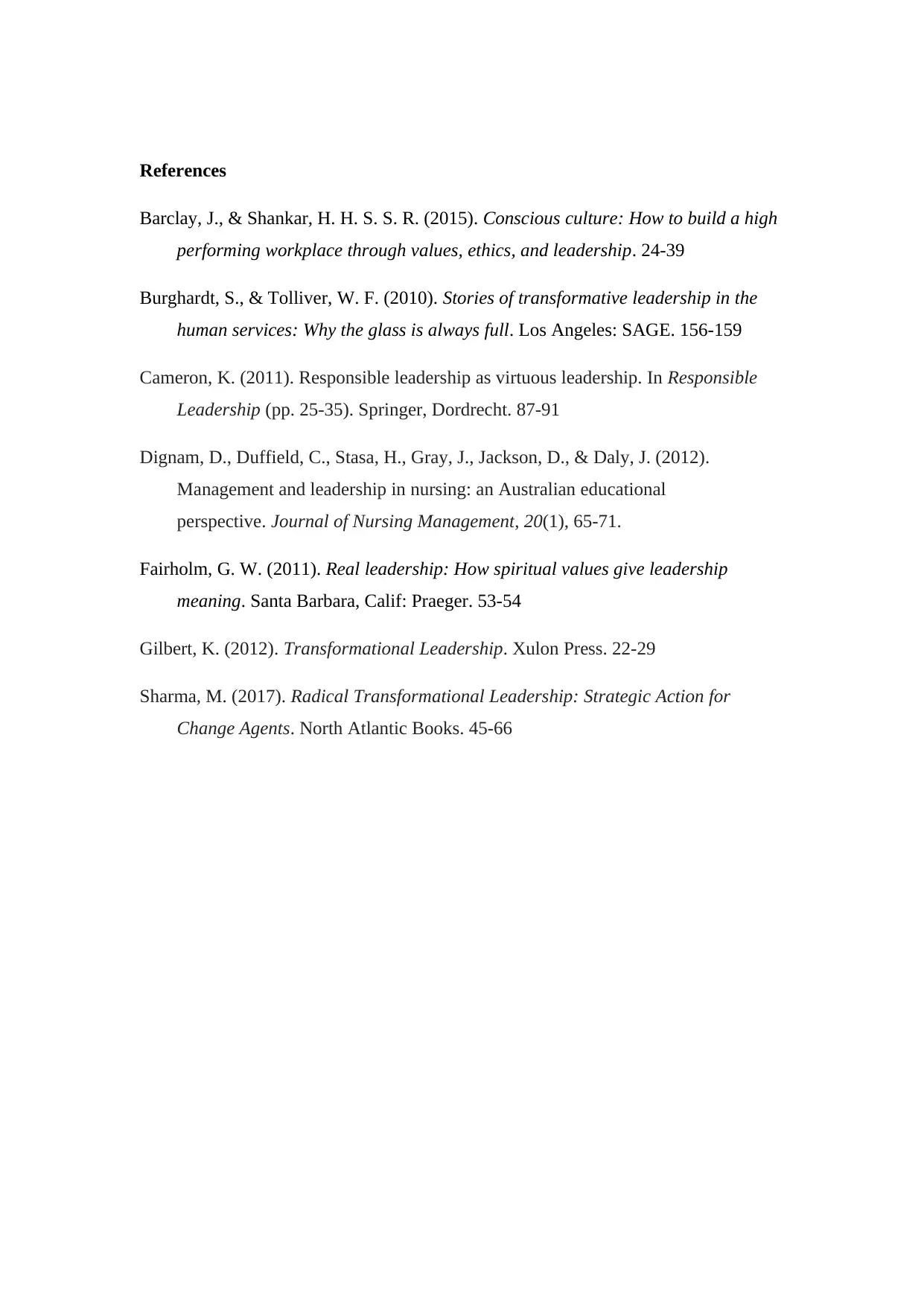Transformational Leadership Values in China: Challenges & Impact
VerifiedAdded on 2023/06/10
|6
|1266
|367
Report
AI Summary
This report examines the challenges of implementing three transformational leadership values—extraversion, conscientiousness, and neuroticism—within the organizational culture of China. It discusses how extraversion, characterized by affiliation and agency, faces difficulties due to large workforces hindering personalized social needs. Conscientiousness, emphasizing diligence and quality, is challenged by China's focus on speed over quality and remuneration systems promoting quantity over quality. Neuroticism, related to anxiety and low self-esteem, struggles against deeply ingrained personality traits. The report analyzes the pros and cons of each value, such as extraversion improving confidence and teamwork but potentially causing laxity, conscientiousness enhancing quality but risking perfectionism-related delays, and low neuroticism fostering positive relations but being difficult to change. The report concludes by highlighting the importance of understanding these values in adapting leadership strategies to China's unique organizational context.

Name of student:
Registration number:
Unit Title:
Unit Code:
Name of Supervisor:
Date due:
Registration number:
Unit Title:
Unit Code:
Name of Supervisor:
Date due:
Paraphrase This Document
Need a fresh take? Get an instant paraphrase of this document with our AI Paraphraser

Introduction
Transformational leadership refers to the theory of leadership where a leader works
with the organization’s teams and identifies need for change and then helps to create a
vision to guide the team in executing the change. Transformational leadership helps to
enhance motivation and hence improve performance. Transformational leadership
helps to achieve change through the following; connecting the team sense of identity
to an organization need or project and the identity of the organization and acting as a
role model to the team for inspiration. This report identifies the three transformational
leadership values that I think would be difficult to implement in the organizational
culture of China (Dignam et al., 2012). These values include; extraversion,
conscientiousness and neuroticism. The report also discusses the advantages and
disadvantages of implementing the above listed values in organization in China.
Extravarsion
There are two main characteristics associated with extraverts. They include affiliation
and agency. Affiliation is the need and desire to feel a sense of belonging and
involvement in a social group. This is closely related to the psychological needs of
human beings where humans have a desire for social belonging. People with high
affiliation needs require approval and warm interpersonal relationships. In order to
successfully implement transformational leadership in an organization context, it is
important for all the people within the organization to feel the need of belonging
(Gilbert, 2012). The person in a position of leadership needs to create a strong bond
with other people so that they can feel part of something important. Implementing
extravarsion in an organization is difficult in China`s organizational culture because
most of the organizations have a huge workforce (Cameron, 2011). This makes it very
difficult to understand individual social needs of employees and attend to them
appropriately.
Pros
Extravarsion improves the self confidence of an individual and hence
increasing productivity.
Creates sense of togetherness and belonging among employees.
Transformational leadership refers to the theory of leadership where a leader works
with the organization’s teams and identifies need for change and then helps to create a
vision to guide the team in executing the change. Transformational leadership helps to
enhance motivation and hence improve performance. Transformational leadership
helps to achieve change through the following; connecting the team sense of identity
to an organization need or project and the identity of the organization and acting as a
role model to the team for inspiration. This report identifies the three transformational
leadership values that I think would be difficult to implement in the organizational
culture of China (Dignam et al., 2012). These values include; extraversion,
conscientiousness and neuroticism. The report also discusses the advantages and
disadvantages of implementing the above listed values in organization in China.
Extravarsion
There are two main characteristics associated with extraverts. They include affiliation
and agency. Affiliation is the need and desire to feel a sense of belonging and
involvement in a social group. This is closely related to the psychological needs of
human beings where humans have a desire for social belonging. People with high
affiliation needs require approval and warm interpersonal relationships. In order to
successfully implement transformational leadership in an organization context, it is
important for all the people within the organization to feel the need of belonging
(Gilbert, 2012). The person in a position of leadership needs to create a strong bond
with other people so that they can feel part of something important. Implementing
extravarsion in an organization is difficult in China`s organizational culture because
most of the organizations have a huge workforce (Cameron, 2011). This makes it very
difficult to understand individual social needs of employees and attend to them
appropriately.
Pros
Extravarsion improves the self confidence of an individual and hence
increasing productivity.
Creates sense of togetherness and belonging among employees.

It encourages teamwork within an organization.
Cons
This may encourage laxity among employees because of the close
interpersonal relationship that they enjoy with their seniors. This may in turn
contribute to decline in performance within an organization.
Some employees are reclusive and may not be interested in close interpersonal
relations with their leaders.
Conscientiousness
Conscientiousness is described as having a strong sense of direction and the ability to
put huge amounts of work into tasks. This value is very important in transformational
leadership since it is crucial in managing the talents of a work force. It is a personality
trait that encompasses being careful and vigilant (Fairholm, 2011). In order for an
organization to achieve its objectives, it is important that all the employees are
efficient and keen when carrying out tasks. Transformational leaders tend to be self-
discipline and they are driven with the desire for perfection. Transformational leaders
also exhibit planned as opposed to spontaneous behavior. It is difficult to implement
this value in China`s organizational behavior because of various factors. One of the
factors is that China has an organizational culture that focuses on how fast tasks are
accomplished as opposed to quality and following due process. This may therefore
encourage employees to accomplish tasks hurriedly and hence making it difficult to
implement this transformational trait. The employee remuneration system where
workers are paid according to quantities produced and encourages unhealthy
competition and workers are no longer keen on the tasks they are undertaking.
Pros
High quality output since tasks are executed carefully.
Increased productivity.
Leaders who are conscientious inspire confidence and act as a good example
to their juniors.
Cons
This may encourage laxity among employees because of the close
interpersonal relationship that they enjoy with their seniors. This may in turn
contribute to decline in performance within an organization.
Some employees are reclusive and may not be interested in close interpersonal
relations with their leaders.
Conscientiousness
Conscientiousness is described as having a strong sense of direction and the ability to
put huge amounts of work into tasks. This value is very important in transformational
leadership since it is crucial in managing the talents of a work force. It is a personality
trait that encompasses being careful and vigilant (Fairholm, 2011). In order for an
organization to achieve its objectives, it is important that all the employees are
efficient and keen when carrying out tasks. Transformational leaders tend to be self-
discipline and they are driven with the desire for perfection. Transformational leaders
also exhibit planned as opposed to spontaneous behavior. It is difficult to implement
this value in China`s organizational behavior because of various factors. One of the
factors is that China has an organizational culture that focuses on how fast tasks are
accomplished as opposed to quality and following due process. This may therefore
encourage employees to accomplish tasks hurriedly and hence making it difficult to
implement this transformational trait. The employee remuneration system where
workers are paid according to quantities produced and encourages unhealthy
competition and workers are no longer keen on the tasks they are undertaking.
Pros
High quality output since tasks are executed carefully.
Increased productivity.
Leaders who are conscientious inspire confidence and act as a good example
to their juniors.
⊘ This is a preview!⊘
Do you want full access?
Subscribe today to unlock all pages.

Trusted by 1+ million students worldwide

Cons
The perfectionist tendencies of leaders with this characteristic may result into
poor work and hence the end result may not be pleasant.
This value may also lead to wastage of time since a lot of time may be taken to
accomplish a simple task that would have otherwise taken a very short period
of time.
Neuroticism
Neuroticism is a value that gives a leader an anxiety related to productivity. In a group
setting, this may make it difficult to implement transformational leadership as a result
of low self esteem. On average, individuals who score high on neuroticism are likely
to be moody and to experience feelings such as anger, anxiety, frustrations, fear,
loneliness, and jealousy (Burghardt & Tolliver, 2010).An individual who is neurotic
responds badly to stressors and they view ordinary situations as threatening. To
implement transformational leadership in the organizational culture of an
organization, it is important that individuals score low on neuroticism. This is because
the leader will be able to relate more easily with the people that they lead. It also
ensures positivity within the organization and good understanding between junior
employees and senior managers. Implementing this value is difficult because, it is
based on behavior which is difficult to change for grownups. Some people also have
the personality of being laid back and are emotionally unstable and hence making it
very difficult to implement this trait.
Pros
Low score of neuroticism ensures good relations between individuals in all levels in
an organization. This maximizes productivity since it creates a positive working
environment for all employees (Barclay& Shankar, 2015).
Individuals with this trait are able to inspire and motivate others towards achieving
organizational goals.
The perfectionist tendencies of leaders with this characteristic may result into
poor work and hence the end result may not be pleasant.
This value may also lead to wastage of time since a lot of time may be taken to
accomplish a simple task that would have otherwise taken a very short period
of time.
Neuroticism
Neuroticism is a value that gives a leader an anxiety related to productivity. In a group
setting, this may make it difficult to implement transformational leadership as a result
of low self esteem. On average, individuals who score high on neuroticism are likely
to be moody and to experience feelings such as anger, anxiety, frustrations, fear,
loneliness, and jealousy (Burghardt & Tolliver, 2010).An individual who is neurotic
responds badly to stressors and they view ordinary situations as threatening. To
implement transformational leadership in the organizational culture of an
organization, it is important that individuals score low on neuroticism. This is because
the leader will be able to relate more easily with the people that they lead. It also
ensures positivity within the organization and good understanding between junior
employees and senior managers. Implementing this value is difficult because, it is
based on behavior which is difficult to change for grownups. Some people also have
the personality of being laid back and are emotionally unstable and hence making it
very difficult to implement this trait.
Pros
Low score of neuroticism ensures good relations between individuals in all levels in
an organization. This maximizes productivity since it creates a positive working
environment for all employees (Barclay& Shankar, 2015).
Individuals with this trait are able to inspire and motivate others towards achieving
organizational goals.
Paraphrase This Document
Need a fresh take? Get an instant paraphrase of this document with our AI Paraphraser

Conclusion
Transformational leadership therefore refers to an approach of leadership where
leaders work together with the organization teams to identify need for change and
create a vision to guide the team in executing the change. The report discusses the
three values of transformational leadership which include extraversion,
conscientiousness, and neuroticism. The report discusses how the three values affects
organizational culture and their advantages and disadvantages when implemented in
an organization.
Transformational leadership therefore refers to an approach of leadership where
leaders work together with the organization teams to identify need for change and
create a vision to guide the team in executing the change. The report discusses the
three values of transformational leadership which include extraversion,
conscientiousness, and neuroticism. The report discusses how the three values affects
organizational culture and their advantages and disadvantages when implemented in
an organization.

References
Barclay, J., & Shankar, H. H. S. S. R. (2015). Conscious culture: How to build a high
performing workplace through values, ethics, and leadership. 24-39
Burghardt, S., & Tolliver, W. F. (2010). Stories of transformative leadership in the
human services: Why the glass is always full. Los Angeles: SAGE. 156-159
Cameron, K. (2011). Responsible leadership as virtuous leadership. In Responsible
Leadership (pp. 25-35). Springer, Dordrecht. 87-91
Dignam, D., Duffield, C., Stasa, H., Gray, J., Jackson, D., & Daly, J. (2012).
Management and leadership in nursing: an Australian educational
perspective. Journal of Nursing Management, 20(1), 65-71.
Fairholm, G. W. (2011). Real leadership: How spiritual values give leadership
meaning. Santa Barbara, Calif: Praeger. 53-54
Gilbert, K. (2012). Transformational Leadership. Xulon Press. 22-29
Sharma, M. (2017). Radical Transformational Leadership: Strategic Action for
Change Agents. North Atlantic Books. 45-66
Barclay, J., & Shankar, H. H. S. S. R. (2015). Conscious culture: How to build a high
performing workplace through values, ethics, and leadership. 24-39
Burghardt, S., & Tolliver, W. F. (2010). Stories of transformative leadership in the
human services: Why the glass is always full. Los Angeles: SAGE. 156-159
Cameron, K. (2011). Responsible leadership as virtuous leadership. In Responsible
Leadership (pp. 25-35). Springer, Dordrecht. 87-91
Dignam, D., Duffield, C., Stasa, H., Gray, J., Jackson, D., & Daly, J. (2012).
Management and leadership in nursing: an Australian educational
perspective. Journal of Nursing Management, 20(1), 65-71.
Fairholm, G. W. (2011). Real leadership: How spiritual values give leadership
meaning. Santa Barbara, Calif: Praeger. 53-54
Gilbert, K. (2012). Transformational Leadership. Xulon Press. 22-29
Sharma, M. (2017). Radical Transformational Leadership: Strategic Action for
Change Agents. North Atlantic Books. 45-66
⊘ This is a preview!⊘
Do you want full access?
Subscribe today to unlock all pages.

Trusted by 1+ million students worldwide
1 out of 6
Related Documents
Your All-in-One AI-Powered Toolkit for Academic Success.
+13062052269
info@desklib.com
Available 24*7 on WhatsApp / Email
![[object Object]](/_next/static/media/star-bottom.7253800d.svg)
Unlock your academic potential
Copyright © 2020–2026 A2Z Services. All Rights Reserved. Developed and managed by ZUCOL.





